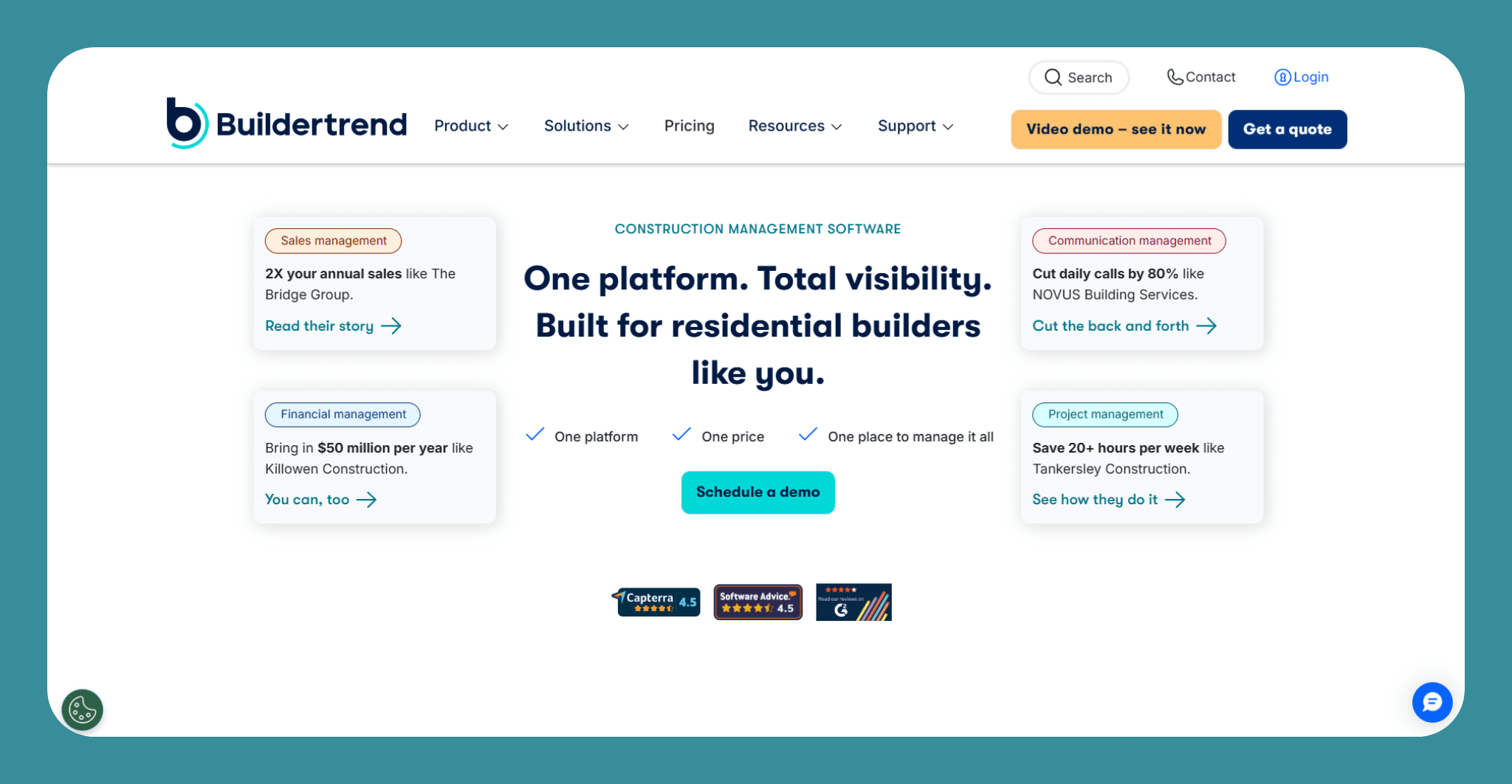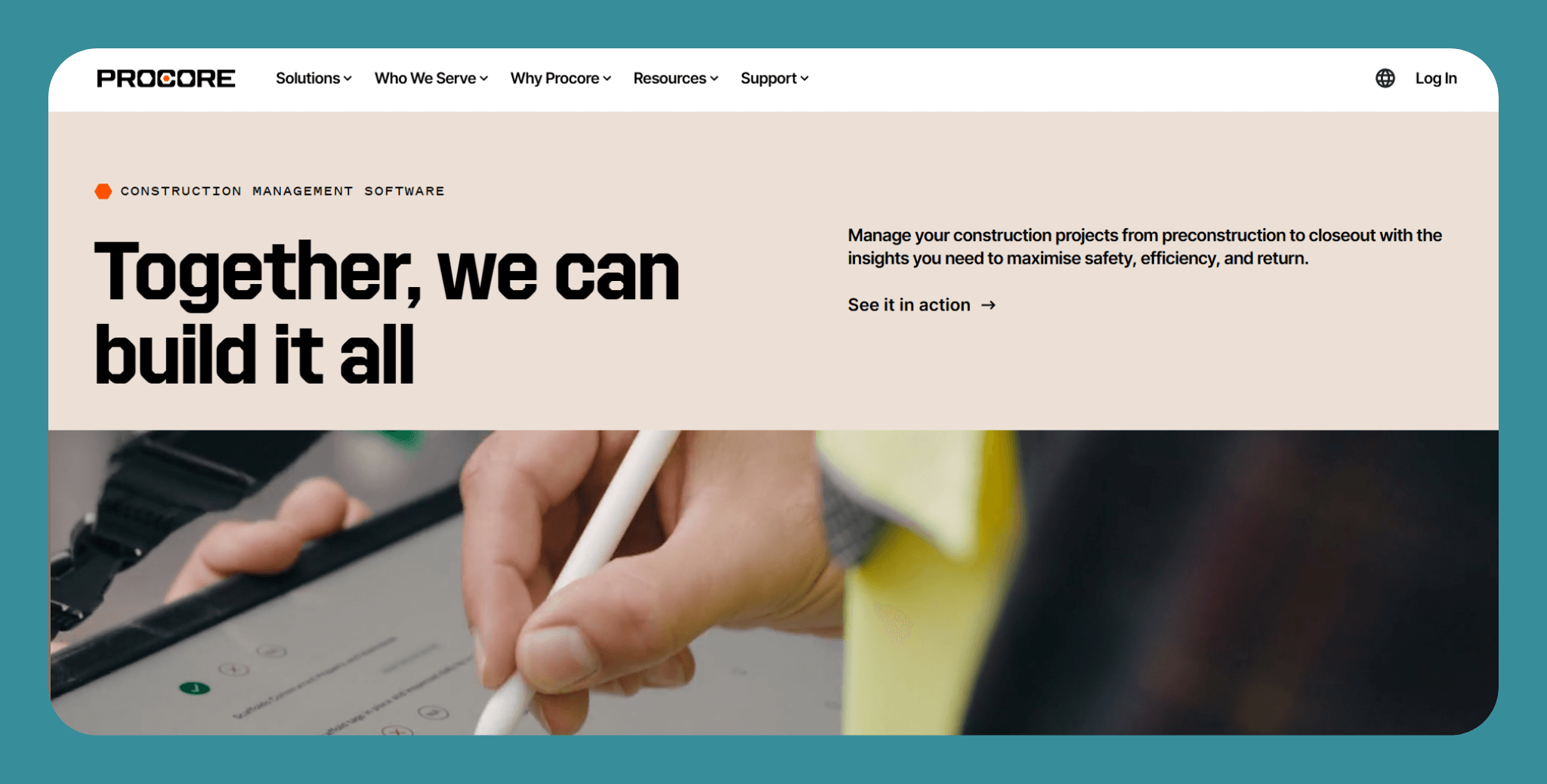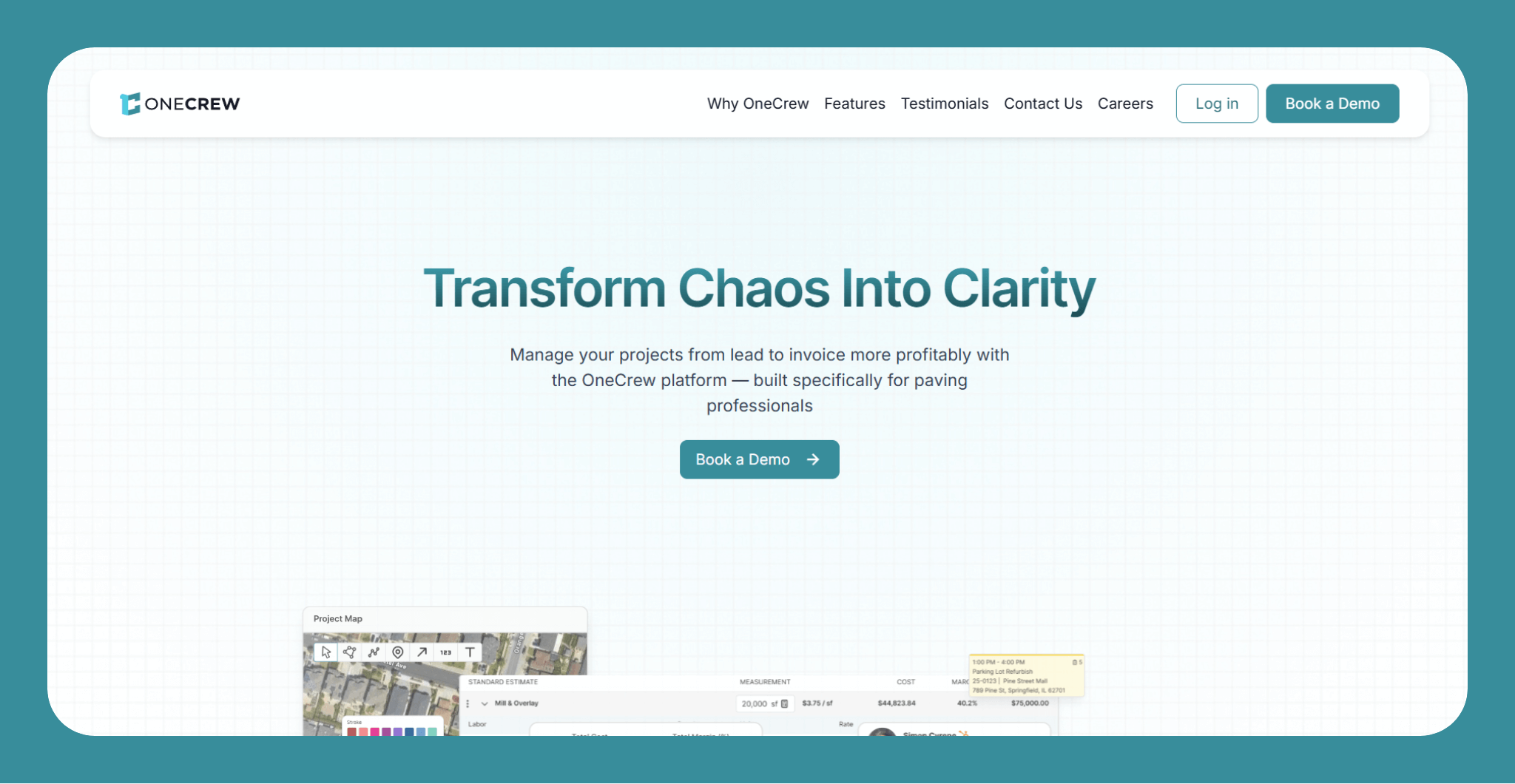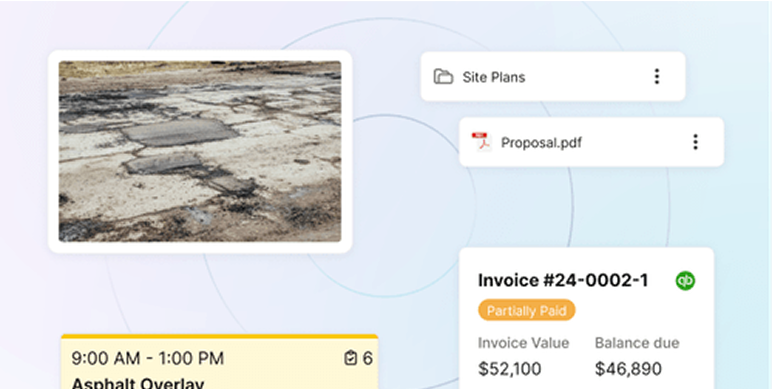Buildertrend vs. Procore vs. OneCrew: Which Wins in 2026?
Most construction teams are juggling 4–7 different tools just to get from estimate to invoice.
If that sounds familiar, you're probably weighing Buildertrend vs. Procore vs. OneCrew to replace that chaos with a platform that actually works.
Buildertrend suits home builders with client-heavy workflows, Procore handles enterprise-level projects, and OneCrew is purpose-built for paving contractors who need fast estimating and clear scheduling.
Each tool has strengths and blind spots. We’ll show you where they shine (and fall short) so you can pick the one that fits how your crew actually works.
Buildertrend vs. Procore vs. OneCrew: What’s the Difference?
The difference between Buildertrend, Procore, and OneCrew comes down to who they’re built for and how they handle construction workflows.
Buildertrend focuses on residential builders, Procore serves large commercial teams, and OneCrew is built specifically for paving contractors.
Buildertrend
Buildertrend is a cloud-based construction management platform designed for home builders, remodelers, and specialty contractors who need strong client communication tools.
Procore
Procore is an enterprise-grade construction management platform favored by large commercial and infrastructure firms that require advanced project controls and compliance tracking.
OneCrew
OneCrew is a purpose-built platform specifically for asphalt and concrete paving contractors who want streamlined, industry-specific workflows.
Which one should you choose?
- Choose Buildertrend if you're a home builder, remodeler, or general contractor managing multiple jobs and clients
- Choose Procore if you lead large-scale commercial or infrastructure projects needing tight project controls, safety tracking, and full documentation
- Choose OneCrew if you run an asphalt and/or concrete paving company and need a platform built around paving-specific workflows
Buildertrend vs. Procore vs. OneCrew: Quick Comparison
Before we dive deep, here's the TL;DR for those of you reading this between job sites:
Buildertrend Features and Highlights

Buildertrend job schedules, client selections, budgets, and client communication. It’s especially strong for managing homeowner-facing work, where change orders, photos, and updates matter as much as costs.
Recent improvements give users faster invoice creation and better visibility into pending expenses. If your team works on multi-phase projects with a lot of client input, Buildertrend helps keep it all organized.
Procore Features and Highlights

Procore is the 800-pound gorilla of commercial construction; the platform your GC probably forced you to use on that one massive project last year. From preconstruction to project closeout, it supports every department: estimating, project management, safety, finance, and operations.
Procore Helix, its AI layer, now surfaces predictive warnings, suggests schedule adjustments, and tracks safety compliance through mobile capture. If you’re bidding on multimillion-dollar jobs with complex stakeholders, compliance requirements, and submittals, Procore gives you control at scale.
OneCrew Features and Highlights

OneCrew was built from the ground up for paving contractors, specifically asphalt and concrete crews working on project-based jobs. Estimators can measure sites (via map or plan), build margin-based bids, and send proposals that clients can approve and pay through a portal.
Scheduling, job costing, and invoicing happen in the same platform, reducing confusion between office and field. It’s a paving platform that replaces disconnected tools with one system that speaks your language.
Buildertrend vs. Procore vs. OneCrew: Feature Comparison
Buildertrend: Estimating and bid creation
- Surface strengths: Built-in proposal tools, change order tracking, and budgets that roll into financials
- Deeper insight: Helps home builders stay consistent, but isn’t customizable enough for trades with non-standard labor or material structures
Procure: Estimating and bid creation
- Surface strengths: Preconstruction module with bid leveling, cost catalogs, and vendor workflows.
- Deeper insight: Designed for RFQs and commercial workflows; not ideal if you need to quote a 2-day paving job by noon
OneCrew: Estimating and bid creation
- Surface strengths: Designed specifically for paving contractors; estimate with site or plan-based measurements, apply margin-driven pricing, and build ready-to-send proposals
- Deeper insight: Contractors report cutting estimating time by up to 75%; OneCrew helps teams quote fast, sell faster, and skip the spreadsheet grind
Winner: OneCrew
Why? Because it’s built for people who measure parking lots at 6 a.m. and need quotes out by lunch. No fluff, no 47-step approval process; just fast, margin-based estimates that actually make sense.
Buildertrend: Scheduling and crew coordination
- Surface strengths: Drag-and-drop Gantt chart, daily logs, task views, and calendar integrations
- Deeper insight: It’s good for tracking remodeling timelines, but not tailored to dispatching field crews across multiple jobs daily
Procure: Scheduling and crew coordination
- Surface strengths: Field coordination, RFI-linked tasks, and project-level scheduling across large teams
- Deeper insight: Strong for big builds with complex GCs, but overkill if your crew is paving three driveways this week
OneCrew: Scheduling and crew coordination
- Surface strengths: Built for fast-moving jobs with multiple crews; assign work orders, track job readiness, and update schedules directly from the field
- Deeper insight: Scheduling in OneCrew feels like it was built by someone who's had to reschedule three crews before their second cup of coffee because it rained for exactly 37 minutes. You know, someone who gets it. It’s simple, visual, and paving-first; not buried in Gantt charts or stuck behind submittals.
Winner: OneCrew
OneCrew is hands down the best platform for paving teams that need to stay flexible.
Buildertrend: Enterprise integration and scale
- Surface strengths: Integrates with accounting tools like QuickBooks and Xero
- Deeper insight: Great for small to mid-sized businesses, but starts to feel limiting as team size and project complexity grow
Procore: Enterprise integration and scale
- Surface strengths: Deep integrations with Sage, Viewpoint, SAP, and custom APIs.
- Deeper insight: Procore is made for scaling, with multi-region contractors, enterprise-grade financials, and advanced permission control.
OneCrew: Enterprise integration and scale
- Surface strengths: Focused integration with QuickBooks Online for billing; all other workflows are unified inside the platform
- Deeper insight: It’s not designed for ERP integration, and that’s the point. OneCrew offers clarity instead of clutter. It’s for teams that don’t necessarily require enterprise IT.
Winners: Procore and OneCrew
It’s a tie. If you need to plug into enterprise tools, Procore is your match. But if you want to run leaner and faster, OneCrew’s simplicity is a definite selling point. OneCrew works with enterprise clients, so it can work with a range of workflows.
What Real Users are Saying
We dug through hundreds of reviews on G2, Capterra, Trustpilot, and other industry platforms (so you don't have to waste your lunch break doing it). Here's what actual contractors are saying when their sales reps aren't listening:
Buildertrend pros
- Client communication & project management: Users frequently praise Buildertrend's features for client communications. One user noted that all client conversations stay centralized within their company system, with the change order functionality being particularly valuable. (January 30th, 2023)
- Mobile app effectiveness: Many users highlight the mobile capabilities. One reviewer explained that crew members in the field can leverage the mobile platform to capture images, log hours, and provide live project updates. (July 21st, 2026)
- Cloud-based accessibility: A G2 reviewer appreciated the cloud-based nature that enables access from any location, noting that having everything stored in the cloud with Excel export capabilities streamlines their calculations and project management tasks. (July 9th, 2026)
Buildertrend cons
- Performance issues: Users report technical problems. One G2 reviewer noted that the platform occasionally runs slowly and includes many unnecessary feature modifications (July 9th, 2026). Another mentioned that the web-based nature sometimes causes slow loading when pages refresh. (January 30th, 2023)
- Limited customization: A G2 user complained about being unable to modify certain prompts fully, leaving users stuck with the built-in default settings. (January 31st, 2023)
- Aggressive sales practices: Multiple BBB reviews mention sales tactics that are, let's say, “enthusiastic.” One user basically said run from the free demo unless you enjoy surprise charges. (October 18th, 2024)
Procore pros
- Good document management: A reviewer noted that the platform excels at construction document organization, providing visibility into RFI status, technical submissions, drawings, and more. The workflow feature shows review assignments and deadlines clearly. (June 12th, 2026)
- Strong mobile access and real-time updates: Users praise mobile capabilities. One reviewer stated that the mobile application performs well and facilitates effective remote teamwork, particularly for field operations. (July 24th, 2026)
- Ease of use: Users find the platform intuitive. One reviewer explained that project information is consolidated in a single location, with access controls that restrict unauthorized viewing. (August 19th, 2024)
Procore cons
- Learning curve and complexity: Users report initial difficulty. One reviewer stated that Procore's weakness is its initially intimidating nature due to its extensive feature set and tool variety. (October 2024)
- Customer support issues: Users report poor support experiences. A Capterra reviewer described the experience as terrible, noting that sales representatives create unrealistic expectations, but support quality drops significantly after payment, with technical assistance being largely unavailable. (June 20th, 2024)
- Limited customization: Users report inflexibility in the platform. One G2 reviewer noted that certain modules lack flexibility, particularly for non-U.S. construction methods, and that workflow and form customization options are restrictive. (July 24th, 2026)
OneCrew pros
- Dramatic administrative improvement: A user explained their migration from manual processes, “I needed to be able to take my mind off of having a mental checklist that we're getting everything done and be able to just focus on what we do: asphalt and concrete.” He described moving from “archaic” manual processes that were “beyond frustrating” to streamlined operations.
- Incredibly easy to use: One user reports that OneCrew is driving his sales team to peak efficiency, with one of them even asking, “Am I doing this right? It seems too easy.” The same user also praised OneCrew’s support and quick response times.
- Scalability for growth-oriented contractors: Another user noted OneCrew's role as a business catalyst, “Having this technology will allow us to grow bigger than a mom-and-pop shop.” His company projects $13 million in revenue and aims to triple in size within 10 years, with OneCrew serving as the Director of Sales calls “the great equalizer” against larger competitors.
OneCrew cons
- No traditional trial period: Unlike some competitors, OneCrew doesn't offer a free trial for potential users to test the platform independently. Contractors must schedule a personalized demo, which can slow down the evaluation process for busy contractors who prefer self-guided assessments.
- Newer platform with limited market maturity: OneCrew is “newer” compared to some of its established competitors. Early adopters often have more direct access to product development teams, but may have fewer third-party integrations and peer resources compared to longer-established platforms.
Which One Should You Choose?
Buildertrend vs. Procore vs. OneCrew is about which one actually fits the way you and your crews work. All three replace spreadsheets, sure, but only OneCrew was built from the ground up for paving contractors.
Buildertrend is better for:
- Residential home builders, remodelers, and design-build contractors
- Teams that need client-facing tools like selections, portals, and visual scheduling
- Those who want a user-friendly platform with solid support but are okay with quote-based Buildertrend pricing
Procore is better for:
- Large-scale general contractors or infrastructure firms
- Teams that need compliance tracking, RFIs, submittals, and complex workflows
- Companies with ERP tools like Sage, Viewpoint, or SAP
- Contractors who prioritize safety modules, bid leveling, and centralized document control
OneCrew is better for:
- Paving contractors, whether you focus on asphalt, sealcoating, or concrete
- Field crews who need mobile quoting, site mapping, and easy scheduling
- Estimators who want fast takeoffs with built-in margin templates
- Crew managers who'd rather eat a bucket of cold asphalt than deal with another comprehensive enterprise solution that takes six months to learn
- Project-based businesses that care more about clear results than flashy dashboards
My Verdict
If you run a paving business, OneCrew is the no-brainer here. Buildertrend's great if you're framing houses. Procore's perfect if you're building airports.
But if you're the one dealing with hot mix temperatures, compaction rates, and customers asking why their driveway isn't done yet? OneCrew actually speaks your language.
OneCrew Was Built for Contractors Who Want Less Hassle
Choosing between Buildertrend vs. Procore vs. OneCrew is about who the platform was built for. If you’re in paving, you already know; most construction apps weren’t built for your kind of work. Builder-focused CRMs? Overkill. Enterprise monsters? Forget it.
OneCrew was made for crews like yours. Build quotes fast from plans or site maps. Assign crews without the chaos. Let clients sign and pay with zero friction. Here’s why contractors are switching:
- Estimate faster: Build bids using PDF takeoffs or site measurements, apply margin-based pricing, and send polished proposals that close more jobs.
- Schedule smarter: Assign work orders, plan out multi-day jobs, and give your field team mobile access to schedules and job details.
- Simplify operations: Replace 4 to 7 disconnected tools with one platform that covers everything from lead intake to invoicing.
- Get clearer insights: See cost breakdowns and job data in one place without second-guessing or juggling spreadsheets.
Ready to stop skipping between spreadsheets? Your crews are already waiting on you, so you might as well give them tools that work as hard as they do. See why contractors are making the switch. Book your free OneCrew demo.
FAQs
1. Is Buildertrend worth it?
Yes, Buildertrend is worth it for home builders and remodelers who need an all-in-one platform to manage client communications, budgeting, scheduling, and selections. It’s especially strong for teams that handle homeowner-facing jobs and want visibility into every phase of the project. Just keep in mind that Buildertrend pricing is quote-based and may not suit every budget.
2. What is the difference between Buildertrend and Procore?
The difference between Buildertrend and Procore is who they're built for. Buildertrend is designed for small to mid-sized residential contractors, whereas Procore is aimed at large commercial firms that need advanced document management, RFIs, and safety tracking. Procore also offers deeper enterprise integrations, which most residential teams won’t need.
3. Is OneCrew a good alternative to Buildertrend or Procore?
Yes, OneCrew is a strong alternative if you run a paving business focused on asphalt or concrete work. Unlike general construction tools, OneCrew is built specifically for estimating, scheduling, and invoicing in project-based paving jobs. It replaces spreadsheets and disconnected tools with a single platform built for how paving contractors operate.
4. Which is better for small construction teams: Buildertrend, Procore, or OneCrew?
For small teams, Buildertrend works best for residential projects, and OneCrew is ideal if you’re in paving. Procore is powerful but often too complex and costly for smaller operations. OneCrew stands out if you want fast estimates, simple scheduling, and a platform that’s easy to adopt.
5. How much does Procore cost per year?
Procore uses a custom, quote-based pricing model that varies depending on your company’s size and construction volume. Though prices aren’t listed publicly, most teams evaluate value based on Procore cost per month during onboarding. Expect to go through a sales consultation to get an accurate number.
6. Does Procore offer more advanced features than Buildertrend?
Yes, Procore offers more advanced features than Buildertrend when it comes to RFIs, submittals, safety documentation, and ERP integrations. It’s built for teams managing complex commercial projects with strict compliance needs. Buildertrend, by contrast, is simpler and better suited to residential workflows.
7. Is there a free trial for OneCrew?
No, OneCrew doesn’t offer a traditional free trial, but you can schedule a personalized demo. The demo lets you walk through the platform and see how it supports estimating, crew coordination, and billing for paving jobs. It's a hands-on way to evaluate if the fit is right for your team.
8. What’s the easiest construction management app to learn quickly?
OneCrew is one of the easiest platforms to learn, especially for paving contractors who don’t want to deal with bloated CRMs or overly technical setups. The interface is clean, focused, and purpose-built for crews that need to quote, schedule, and invoice without delay. If you want results fast, OneCrew is designed for quick adoption.


